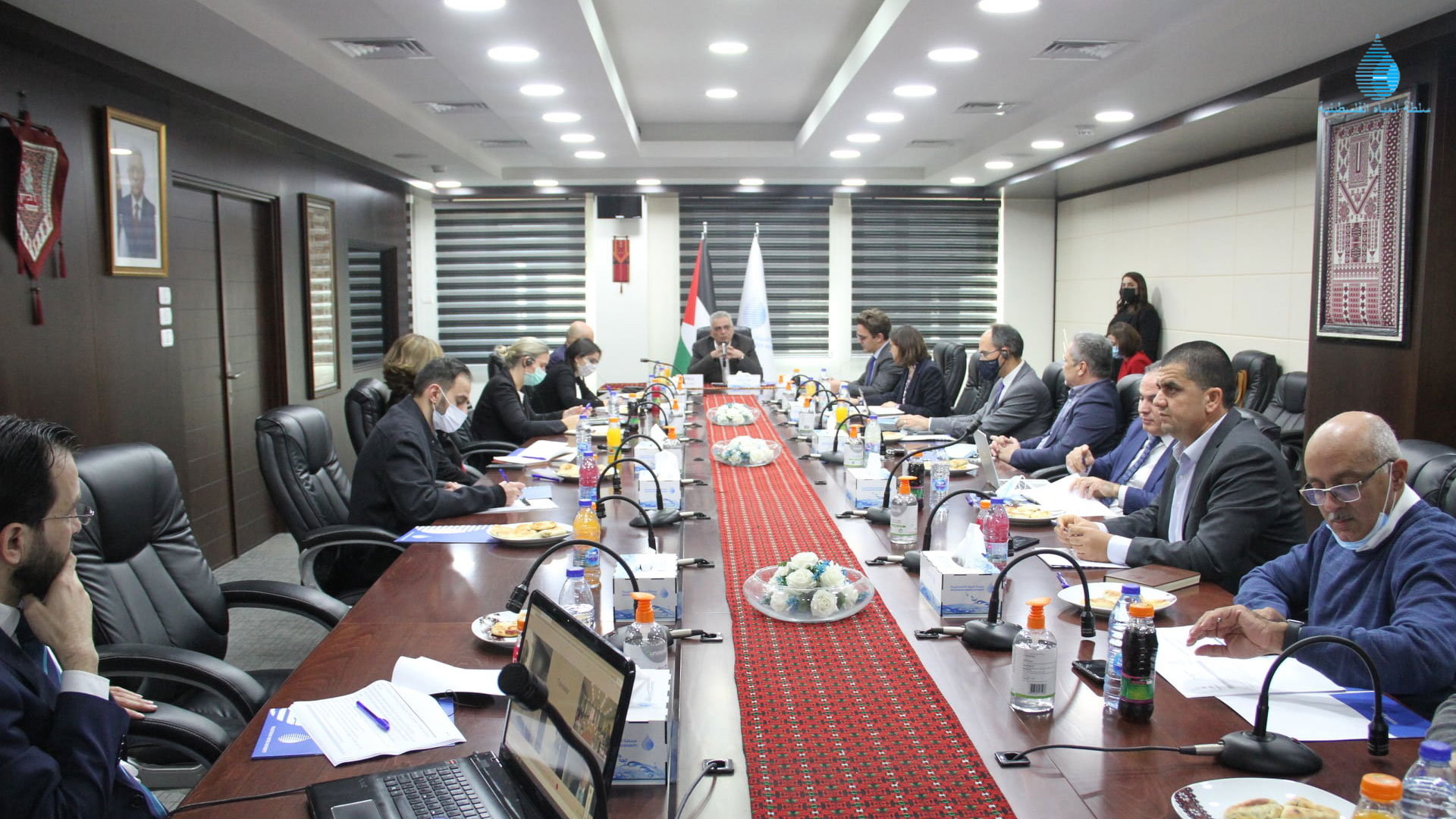Ramallah - The Head of the Water Authority, Eng. Mazen Ghunaim, chaired today the regular meeting of the Sectoral Working Group working in the water sector, in the presence of international donors, United Nations organizations, member ministries, and civil society partners.
The meeting aims to discuss developments in the work of existing and future projects and programs, as well as ways to achieve them and overcome obstacles facing them. It also sets out future priorities and requirements that require joint action to achieve the desired goals.
Eng. Ghunaim began by emphasizing the priorities that the Water Authority will work on over the next four years, which include, as a first priority, the issue of transboundary wastewater and the search for sustainable solutions to reduce the unilateral discounts carried out by the Israeli side through the construction of sewage and water-reuse systems within a comprehensive system.
He spoke of the second priority, which is supplying additional quantities of water through connecting points and establishing new systems to supply the water purchased from Israel to fill the existing deficit, bringing the current total to an average of 180 million cubic meters for the West Bank and Gaza, by giving priority to 11 main bulk supply points in the West Bank. He pointed out that due to the severe water crisis in the southern West Bank, the connecting point in al-samou was considered a top priority. The third priority is related to increasing the extraction of water from the aquifers, and the importance of increasing the amounts extracted from them by the Palestinians. Regarding the fourth priority, the reconstruction of the Gaza Strip, Eng. Ghunaim pointed out that international reports have estimated the volume of losses in the water and sanitation sector as a result of the recent Israeli aggression on the Gaza Strip at nearly 30 million dollars in direct or indirect damages, which is about 16 million dollars in direct damages, and to date a total of 10 million dollars has been provided by the German Development Bank, the Red Cross, UNICEF, Qatar Charity and Oxfam, and thus there is an urgent need to provide the necessary support for the reconstruction of Gaza.
Ghunaim also briefed the attendees on the qualitative achievements made in cooperation with partners during the past three years, despite the exceptional political and economic circumstances, which included the road map for the reform program adopted by the Council of Ministers, through which a set of necessary regulations and instructions were adopted, including the system of licenses for drilling wells and groundwater extraction and its instructions, the system of standardized tariffs for water and sanitation, and others
In addition, a number of important projects have been completed in the area of infrastructure, including the rehabilitation of the water system in the villages of Sebastia and Qablan, the waste water management project with its various components in Hebron, as well as the project for additional water (connection points) in Ramallah, which is expected to begin bidding procedures by the end of this year. In addition, the projects implemented in Gaza, such as the project for improving the additional water supply in the governorate of Khan Younis and al-Wasta, which contributed to the doubling of the water in Khan Younis and al-Wasta, the projects for the construction of the South Line, the central pumping station, and a sub-pumping station, in addition to four reservoirs. In addition, work is being carried out on the Water Security Development Project - Gaza Central Water Desalination Program and associated works, and other projects.
During the meeting, Ghunaim stressed the important role of donor countries and partners in activating the emergency response clause, pressuring Israel to facilitate the entry of individuals and materials needed to operate water and sanitation facilities, as well as pressing the Israeli side to agree to the site of the disposal of the dust from the Hebron area in Area C, to develop a program for the treatment and reuse of wastewater in the West Bank. He also called on donors to put pressure on the Israeli side to establish a clear mechanism for the treatment of transboundary wastewater, clarifying quantities and prices, and to give the Palestinian side the right to review and amend it, among other important issues.
Concluding, he stressed that the partner countries should take into consideration the international priorities related to climate change and its great connection with the water sector, and translate the outcomes of the international reports and conferences, especially the recent climate conference COP26 held in British Glasiko, which requires joint cooperation in the development of special strategies and the raising of local capacities in the area of climate monitoring and adaptation, and requires the launching of effective imitative in this field.
The meeting also touched on the Israeli obstacles in the water and sanitation sector, which reflect negatively on the Palestinians, and to inform the participants of the latest developments in the water sector reform program and the steps aimed at establishing capable and sustainable institutions within a legal framework to carry out their responsibilities to the fullest extent through the developed water and sanitation strategies, policies and programs and the design and implementation of projects.
